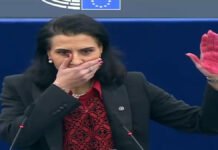Poorer countries are angered at proposals by the Commission to cut their aid money
A day after the European Union waved goodbye to Britain, some of Europe’s poorest nations urged the bloc’s leaders not to implement a “sharp and disproportional” cut to their aid money in the next long-term budget.
The European Union provides aid known as cohesion funds to member states in the south and east to help them invest in development and catch up with richer peers to the north and west.
But various proposals by the so-called “frugal” countries, including paymaster Germany in September, seek to reduce the size of the cohesion funds and attach conditions which would predetermine areas where investments should go.
According to European Parliament website, the European Commission proposed an allocation of 41.3 billion euros ($45.82 billion) to cohesion funds for the 2021-2027 programming period, down from 63.4 billion euros set aside in 2014-2020.
The proposals to cut the funds made blood boil among the poorer EU nations, creating an impasse as the next long-term budget is being prepared.
Leaders of affected nations gathered for the Friends of Cohesion summit in the Portuguese city of Beja on Saturday and in a joint declaration said funding for 2021-2027 “should maintain the level” of the previous budget.
“At a time the union becomes more fragile (after Brexit), our message should be in favour of a cohesive Europe,” Portugal’s Prime Minister Antonio Costa told reporters after the declaration was signed by 15 countries, including once-bailed out Greece.
Britain accounted for around 15% of the EU’s economy and was the bloc’s biggest military spender.
In the declaration, the nations said “any cuts in investment capacity of cohesion regions would be unacceptable” and that, at this late stage of the long-term budget negotiations, “no technical elements with major negative impact should be introduced”.
Any changes would “unnecessarily” delay an agreement, they added.
The summit took place days after President of the European Council Charles Michel called a special meeting with EU leaders on Feb. 20 to discuss the budget. Michel will meet several prime ministers over the next week.
“I am fully aware that these negotiations are among the most difficult ones we have to face,” he wrote in a letter sent to leaders on Jan. 25.
The current EU budget amounts to 1% of the bloc’s combined Gross National Income (GNI). The European Commission has proposed a seven-year budget of about 1.1 trillion euros that would be about 1.11% of the EU’s combined GNI.
Scared of having to dig too deep to fill the budget gap caused by Brexit, Germany proposed a 1% cap.
Austria: Sebastian Kurz threatens to veto EU post-Brexit budget

Austria’s conservative leader has said he will not accept the EU’s push for an increased budget of 1.11%. The departure of net contributor Britain from the EU diminishes the bloc’s shared budget, straining member states.
Austrian Chancellor Sebastian Kurz announced Saturday that Austria and other countries will veto the European Union’s long-term budget plan for post-Brexit Europe unless the proposed budget is lowered.
The European Commission has been pushing members for contributions of 1.11% as a share of gross national income (GNI). Austria, along with Germany and the Netherlands, is demanding a 1% cap.
“If this proposal is introduced, we will not support it, and neither will the other EU net contributors, I think,” the conservative leader told Austrian radio Oe1, referring to member states that contribute more into the bloc’s budget than they receive in EU funding.
“The 1.11% is still not acceptable to us. So there would be a veto on our part here,” Kurz said.
Britain’s official exit from the EU on Friday evening diminished the bloc’s shared budget. After 47 years of membership, Britain had been a key net contributor to the bloc.
“I do hope that we will be presented with a new proposal that we will hopefully be able to accept,” he said.
Kurz’s statement comes not long after EU leaders had emphasized new priorities for the bloc including migration, climate change, and digitalization.
European Council President Charles Michel has called for a special EU leaders summit on February 20 in Brussels to negotiate the next shared budget for 2021 to 2027.
Next week, the Council leader is set to meet up with 16 heads of state and government representatives for separate talks on the EU’s budget. Kurz is scheduled to attend the meeting on Wednesday.
Claudia Gamon, member of the National Council of Austria and a member of the European parliament, said that in the post-Brexit era, it was “time for a strong EU, ” according to the Austrian newspaper Kronen Zeitung.
“If you torpedo the common goals now, you are moving into dangerous waters,” she said.
Kurtz warned in an interview with Austrian broadcaster ORF, Kurz said: “If this proposal is tabled in this way, there will be no approval from us here, and I don’t think from the other EU net contributors either.”
THE EU has been accused of planning cutting funds by as much as 50 percent to some of the poorest on the continent to offset Brexit costs and ramp up defence projects.
The Guardian reported that the European commission has been accused of seeking to cut EU funding for the continent’s poorest people by 50% to secure post-Brexit cost savings and extra funds for defence projects. The commission wants to spend €13bn on a European defence fund to coordinate research and investment after calls from the French president, Emmanuel Macron, for greater EU military independence from the US.
?Our President is speaking about Economic Solidarity at the 40 Meeting Rimini @MeetingRimini #meeting19 #riminifiera #solidarity pic.twitter.com/3Mw0czW1Eg
— European Food Banks Federation – FEBA (@EuroFoodBanks) August 22, 2019
Jacques Vandenschrik, the president of the European Food Banks Federation, said the EU executive’s proposed spending plans for the next seven years posed a risk not only to the most vulnerable but to the stability of wider society. Vandenschrik, whose organisation helps food banks across Europe to distribute surplus produce to where it is most needed with the assistance of cash from FEAD, said the commission’s proposal was a “false economy”.
The current budget ending in 2020 contained a €3.8bn fund for European aid to the most deprived (FEAD) to help EU member states provide people with food and basic supplies such as clothing, shoes, soap and shampoo.
Under the proposed 2021-27 budget there would be no such dedicated fund but member states would be asked to devote a minimum of €2bn in total to food and basic material assistance. The commission has said it hopes member states will allocate twice that minimum amount – but there would not be any obligation.
He said: “I think we must do better for the poorest of the poor. We cannot accept that we must deliver half or 60% of the food that they receive now. The explanation is that the overall budget of Europe needs to be tightened up. Brexit is one of the arguments. The UK paid about £15.5bn into the EU budget in 2018. The other is the need for the strengthening of the defence of Europe. But this will have an impact on health and social cohesion.
It is a false economy to save on the poor. It is far better to increase their purchase power by giving them food so that the little money they don’t spend on food they can spend on the economy.”
Food banks represented by Vandenschrik’s umbrella organisation fed 9.5 million people in 2018 and distributed 781,00 tonnes of food, equating to 4.3m meals a day.
Vandenschrik said the poorest people in eastern European member states would probably be hit hardest by the commission’s proposals. About 33.1 million people or 6.6% of the EU population are estimated to be living in severe material deprivation.
Vandenschrik said: “The consequences will be an increase in instability and incivility. If people and their children are hungry, they will make plans. And this might not be very nice for society.
We cannot make progress by leaving the poor on the side. This is not the way to make our society better.”
Help Us Sustain Ad-Free Journalism
Sorry, I Need To Put Out the Begging Bowl
Independent Journalism Needs You
Our unwavering dedication is to provide you with unbiased news, diverse perspectives, and insightful opinions. We're on a mission to ensure that those in positions of power are held accountable for their actions, but we can't do it alone. Labour Heartlands is primarily funded by me, Paul Knaggs, and by the generous contributions of readers like you. Your donations keep us going and help us uphold the principles of independent journalism. Join us in our quest for truth, transparency, and accountability – donate today and be a part of our mission!
Like everyone else, we're facing challenges, and we need your help to stay online and continue providing crucial journalism. Every contribution, no matter how small, goes a long way in helping us thrive. By becoming one of our donors, you become a vital part of our mission to uncover the truth and uphold the values of democracy.
While we maintain our independence from political affiliations, we stand united against corruption, injustice, and the erosion of free speech, truth, and democracy. We believe in the power of accurate information in a democracy, and we consider facts non-negotiable.
Your support, no matter the amount, can make a significant impact. Together, we can make a difference and continue our journey toward a more informed and just society.
Thank you for supporting Labour Heartlands












